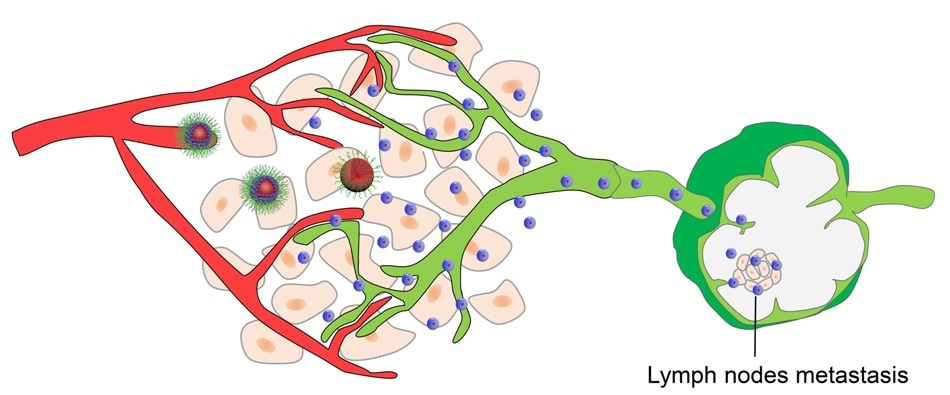Aug 16 2019
Metastasis, in which cancer cells break free from the primary tumor and form tumors at other sites, worsens the prognosis for many cancer patients. The lymph nodes –– glands of the immune system located throughout the body –– are typically the traveling cells’ first destination. Now, researchers have developed a strategy to target metastases in lymph nodes for destruction, before they can cause cancer at other locations. They report their results in ACS Nano.
 iClusters (red/blue/green circles) enter a tumor through the bloodstream (red vessels), then disassemble into smaller nanoparticle drugs (blue circles) that can pass through lymphatics (green vessels) into lymph nodes and kill metastases. (Credit: Adapted from ACS Nano 2019, 10.1021/acsnano.9b03472)
iClusters (red/blue/green circles) enter a tumor through the bloodstream (red vessels), then disassemble into smaller nanoparticle drugs (blue circles) that can pass through lymphatics (green vessels) into lymph nodes and kill metastases. (Credit: Adapted from ACS Nano 2019, 10.1021/acsnano.9b03472)
Soon after a patient is diagnosed with cancer, they typically undergo lymph node biopsies to determine if their cancer has spread. However, this surgical procedure can cause pain, infection and other problems. Studies have shown that cancer cells travel from tumors to specific lymph nodes primarily through tiny vessels called lymphatics, which carry immune cells and fluid rather than blood. So, a treatment that could be injected into the bloodstream, enter a tumor and then pass through the lymphatics might treat metastases. Hong-Jun Li, Jin-Zhi Du and colleagues had previously developed a nanoparticle delivery tool, called iCluster, that travels through the bloodstream to a tumor. It’s a large cluster of nanoparticles, and the acidic environment of the tumor causes iCluster to disassemble into its smaller components, which can penetrate deep into tumors and deliver chemotherapies. But the team wondered whether these smaller nanoparticles could also pass through the lymphatics that connect the tumor to lymph nodes.
To find out, Li, Du and colleagues injected iCluster, labeled with a red dye, into the bloodstream of mice with transplanted tumors. By fluorescent imaging, they observed that small nanoparticles carrying the chemotherapy drug cisplatin could indeed pass through the lymphatics from the tumor to adjoining lymph nodes. In another experiment, the researchers treated mice with primary tumors before metastasis with iCluster, and a couple of days later, surgically removed their primary tumors, similar to what would be done for cancer patients. About 40% of the treated mice were still alive 110 days later. That’s in contrast to the untreated mice — all of them died from metastases within 51 days of surgery. Then, the team tested the therapy on mice that already had metastases. The iCluster-treated mice lived longer, and upon autopsy, had far fewer tumors than untreated mice.
The authors acknowledge funding from the National Key R&D Program of China, the National Natural Science Foundation of China, Guangdong Natural Science Funds for Distinguished Young Scholars, the Program for Guangdong Introducing Innovative and Entrepreneurial Teams, Guangdong Provincial Pearl River Talents Program, Outstanding Scholar Program of Guangzhou Regenerative Medicine and Health Guangdong Laboratory, Young Elite Scientists Sponsorship Program by CAST, the China Postdoctoral Science Foundation, the Natural Science Foundation of Guangdong Province, Science and Technology Program of Guangzhou and the Fundamental Research Funds for the Central Universities and 111 Project.